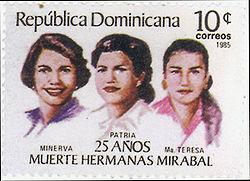The Mirabel Sisters (Deomocracy Campaigners)
 Patria Mercedes Mirabal (February 27, 1924 – November 25, 1960), Bélgica Adela "Dedé" Mirabal-Reyes (March 1, 1925 – present), María Argentina Minerva Mirabal (March 12, 1926 – November 25, 1960) and Antonia María Teresa Mirabal (October 15, 1935 – November 25, 1960) were citizens of the Dominican Republic who fervently opposed the dictatorship of Rafael Trujillo.
Patria Mercedes Mirabal (February 27, 1924 – November 25, 1960), Bélgica Adela "Dedé" Mirabal-Reyes (March 1, 1925 – present), María Argentina Minerva Mirabal (March 12, 1926 – November 25, 1960) and Antonia María Teresa Mirabal (October 15, 1935 – November 25, 1960) were citizens of the Dominican Republic who fervently opposed the dictatorship of Rafael Trujillo.
Dedé Mirabal was not assassinated and has lived to tell the stories of the death of her sisters. Presently, she still lives in Salcedo, Dominican Republic. She resides in the house where the sisters were born and works to preserve her sisters' memory through the Museo Hermanas Mirabal which is also located in Salcedo and was home to the women for the final ten months of their lives. She has written her first and only book Vivas en El Jardín, released on August 25, 2009.
Minerva studied law and became a lawyer, but because she declined Trujillo's romantic advances, he ordered that while she would be issued a degree she was not to receive her practitioner's license. Her sisters followed suit, and they eventually formed a group of opponents to the Trujillo regime, known as the Movement of the Fourteenth of June. Inside that group, they were known as "The Butterflies" (Las Mariposas in Spanish). They are known as Las Mariposas because that was the underground name that Minerva was recognized as in political dealings. Two of the sisters, María Argentina Minerva Mirabal and Antonia María Teresa Mirabal, were incarcerated and tortured on several occasions. While in prison they were constantly raped. Three of the sisters' husbands were incarcerated at La Victoria Penitentiary in Santo Domingo.
Despite these setbacks, they persisted in fighting to try to end Trujillo's dictatorship. After the sisters' numerous imprisonments, Trujillo was blamed for their murders, but this is unverifiable, new sources indicate that they may have been killed by Luis Amiama Tió, perhaps to create a rise in anti Trujillo sentiments. On November 25, 1960, he sent men to intercept the three women after they visited their husbands in prison. The unarmed sisters were led into a sugarcane field and executed along with their driver, Rufino de la Cruz. Their car was later thrown off of a mountain known as La Cumbre, between the cities of Santiago and Puerto Plata, in order to make their deaths look like an accident.
On December 17, 1999, the United Nations General Assembly designated November 25 (the anniversary of the day of the murder of the Mirabal sisters) as the annual date for the International Day for the Elimination of Violence Against Women in commemoration of the sisters. This day also marks the beginning of the 16 days of Activism against Gender Violence. The end of the 16 Days is December 10, International Human Rights Day.
In 1994, Dominican-American author Julia Álvarez published her novel In the Time of the Butterflies, a fictionalized account of the lives of the Mirabal sisters. The novel was adapted into the 2001 movie In the Time of the Butterflies, starring Salma Hayek as Minerva, Edward James Olmos as Trujillo, and singer Marc Anthony in a supporting role.
The sisters are mentioned in The Brief Wondrous Life of Oscar Wao (2007) by Dominican-American novelist Junot Díaz.
The story is fictionalized in the children's book How the Butterflies Grew Their Wings by Jacob Kushner.
Actress Michelle Rodriguez is currently involved in a film adaptation of the true story of the sisters called Trópico de Sangre, which recently wrapped filming in the Dominican Republic. Rodriguez plays Minerva Mirabal and also co-produces the film with her company Cheshire Kat Productions in association with Kemasi Films. Dedé Mirabal, the real life surviving sister, is participating in the development of the film.
Related Links:
The Mirabel Sisters on Wikipedia